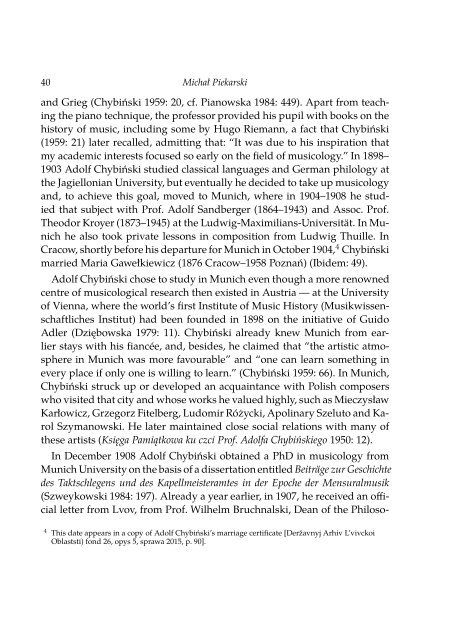Musicology Today 2012 100 Years of Polish Musicology
Musicology Today 2012 100 Years of Polish Musicology
Musicology Today 2012 100 Years of Polish Musicology
You also want an ePaper? Increase the reach of your titles
YUMPU automatically turns print PDFs into web optimized ePapers that Google loves.
40 Michał Piekarski<br />
and Grieg (Chybiński 1959: 20, cf. Pianowska 1984: 449). Apart from teaching<br />
the piano technique, the pr<strong>of</strong>essor provided his pupil with books on the<br />
history <strong>of</strong> music, including some by Hugo Riemann, a fact that Chybiński<br />
(1959: 21) later recalled, admitting that: “It was due to his inspiration that<br />
my academic interests focused so early on the field <strong>of</strong> musicology.” In 1898–<br />
1903 Adolf Chybiński studied classical languages and German philology at<br />
the Jagiellonian University, but eventually he decided to take up musicology<br />
and, to achieve this goal, moved to Munich, where in 1904–1908 he studied<br />
that subject with Pr<strong>of</strong>. Adolf Sandberger (1864–1943) and Assoc. Pr<strong>of</strong>.<br />
Theodor Kroyer (1873–1945) at the Ludwig-Maximilians-Universität. In Munich<br />
he also took private lessons in composition from Ludwig Thuille. In<br />
Cracow, shortly before his departure for Munich in October 1904, 4 Chybiński<br />
married Maria Gawełkiewicz (1876 Cracow–1958 Poznań) (Ibidem: 49).<br />
Adolf Chybiński chose to study in Munich even though a more renowned<br />
centre <strong>of</strong> musicological research then existed in Austria — at the University<br />
<strong>of</strong> Vienna, where the world’s first Institute <strong>of</strong> Music History (Musikwissenschaftliches<br />
Institut) had been founded in 1898 on the initiative <strong>of</strong> Guido<br />
Adler (Dziębowska 1979: 11). Chybiński already knew Munich from earlier<br />
stays with his fiancée, and, besides, he claimed that “the artistic atmosphere<br />
in Munich was more favourable” and “one can learn something in<br />
every place if only one is willing to learn.” (Chybiński 1959: 66). In Munich,<br />
Chybiński struck up or developed an acquaintance with <strong>Polish</strong> composers<br />
who visited that city and whose works he valued highly, such as Mieczysław<br />
Karłowicz, Grzegorz Fitelberg, Ludomir Różycki, Apolinary Szeluto and Karol<br />
Szymanowski. He later maintained close social relations with many <strong>of</strong><br />
these artists (Księga Pamiątkowa ku czci Pr<strong>of</strong>. Adolfa Chybińskiego 1950: 12).<br />
In December 1908 Adolf Chybiński obtained a PhD in musicology from<br />
Munich University on the basis <strong>of</strong> a dissertation entitled Beiträge zur Geschichte<br />
des Taktschlegens und des Kapellmeisteramtes in der Epoche der Mensuralmusik<br />
(Szweykowski 1984: 197). Already a year earlier, in 1907, he received an <strong>of</strong>ficial<br />
letter from Lvov, from Pr<strong>of</strong>. Wilhelm Bruchnalski, Dean <strong>of</strong> the Philoso-<br />
4 This date appears in a copy <strong>of</strong> Adolf Chybiński’s marriage certificate [Deržavnyj Arhiv L’vivckoi<br />
Oblaststi) fond 26, opys 5, sprawa 2015, p. 90].
















